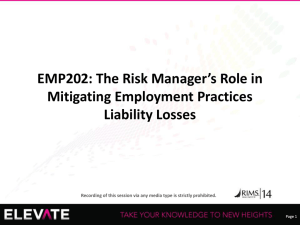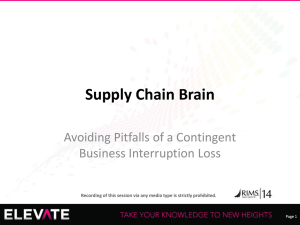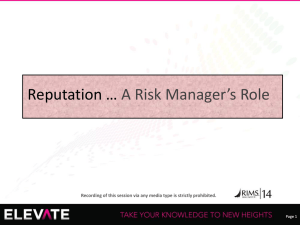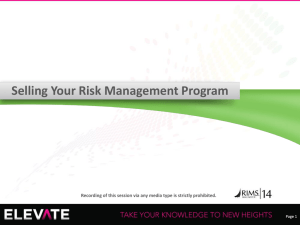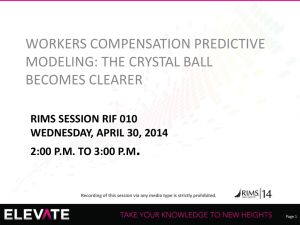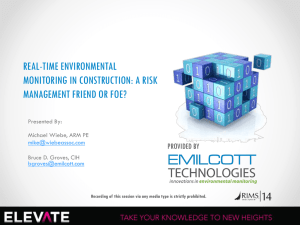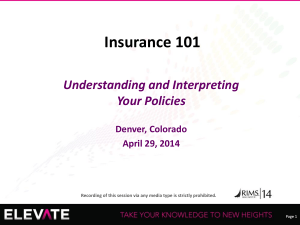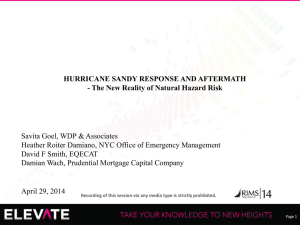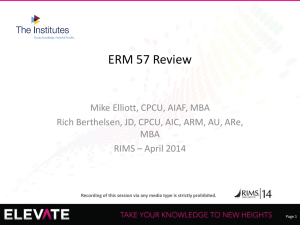FINAL Top 10 Mistakes PowerPoint Presentation
advertisement
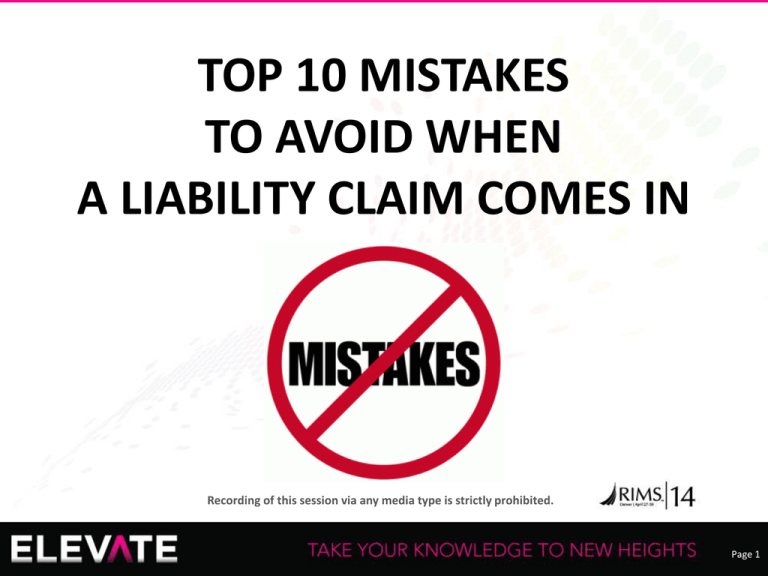
TOP 10 MISTAKES TO AVOID WHEN A LIABILITY CLAIM COMES IN Recording of this session via any media type is strictly prohibited. Page 1 Sarah E. Millin Robert C. Vryhof Partner & Insurance Co-Chair Lathrop & Gage LLP Kansas City, Missouri smillin@lathropgage.com Vice President, Risk Management Republic Services, Inc. Phoenix, Arizona rvryhof@republicservices.com Recording of this session via any media type is strictly prohibited. Page 2 What to Expect • • • How to ensure all relevant liability coverage is in play as soon as possible How to work with insurers after tender to maximize their contribution How to protect confidential and privileged communications when insurance is involved Recording of this session via any media type is strictly prohibited. Page 3 1. Overlooking Potentially Covered Allegations in the Complaint • Dissect the complaint Identify all possible claims and damages o Sometimes covered allegations are not obvious o Insured only needs one potentially covered claim to trigger defense o • • • • Study each paragraph – do not skim Don’t rely on headings Assume only necessary bad elements Resolve all doubts in favor of coverage Recording of this session via any media type is strictly prohibited. Page 4 Coverage-Triggering Allegations MAY NOT BE COVERED: MAY NOT BE COVERED: MAY NOT BE COVERED: “PETITION FOR PRELIMINARY INJUNCTION, PERMANENT INJUNCTION, AND CIVIL PENALTIES” “ . . . fraudulent marketing scheme of the Defendants . . . ” BUT WHAT ABOUT: “ . . . failed to disclose known side effects ...” “ . . . action seeking to declare the invalidity of a patent and to recover damages for patent infringement, misappropriation of trade secrets, and unfair competition . . . ” “ . . . is liable for costs . . . ” BUT WHAT ABOUT: BUT WHAT ABOUT: “ . . . has caused damages . . . ” “ . . . knew or in the exercise of reasonable care should have known of the defective nature . . . ” “ . . . damage and injury by spreading false rumors . . . ” “ . . . and grant such further relief as the court deems just and proper.” Recording of this session via any media type is strictly prohibited. Page 5 2. Ignoring Extrinsic Evidence That May Trigger Coverage • Look outside the complaint where permitted o o o The complaint often does not tell the entire story Many jurisdictions require the insurer to consider all extrinsic evidence available Only some jurisdictions allow carriers to deny coverage based on extrinsic evidence Recording of this session via any media type is strictly prohibited. Page 6 Ignoring Extrinsic Evidence That May Trigger Coverage • Remember that a “suit” is not always necessary to trigger a defense obligation o o o Some liability policies only require the assertion of a “claim” May not have to be in writing – a verbal demand or allegation of liability may suffice Even where policy requires a “suit,” some jurisdictions interpret that word broadly Recording of this session via any media type is strictly prohibited. Page 7 Ignoring Extrinsic Evidence That May Trigger Coverage • If the insurer denies, forward each later document that may trigger coverage o o o o Amended pleadings Written discovery responses Deposition transcripts Anything that establishes the potential for coverage Recording of this session via any media type is strictly prohibited. Page 8 3. Failing to Identify All Potentially Applicable Policies • Look for coverage in unlikely places Auto accident damages under CGL? o TCPA damages under D&O? o • • • Remember that multiple lines may apply Remember to tender under all potentially applicable coverage years Find missing policies by using secondary policy evidence Archaeology -- find lost or missing policies o Reconstruction -- establish terms of missing, incomplete or illegible policies o • Seek coverage under policies as an additional insured Recording of this session via any media type is strictly prohibited. Page 9 4. Failing to Properly Notice Claims • Benefits of proper notice o o o Eliminates prejudice argument Avoids disputes over pre-tender defense costs Preserves rights Recording of this session via any media type is strictly prohibited. Page 10 Failing to Properly Notice Claims • The Basics o o o o o Notify promptly under every potentially relevant policy Follow specific policy provisions Provide basic, factual information and avoid unnecessary characterizations Attach demand, complaint, summons or other coveragetriggering document Even a “soft-tender” may be sufficient Recording of this session via any media type is strictly prohibited. Page 11 Failing to Properly Notice Claims • “Claims-made” policies o o o o o Pay particular attention to terms and deadlines Don’t ignore claims-made excess coverage Notice may be required before suit Check for notice provisions on potential claims “Claims-made” and “claims-madeand-reported” often treated the same Recording of this session via any media type is strictly prohibited. Page 12 Failing to Properly Notice Claims • Notice as an additional insured o o o o Notify carrier directly Don’t rely on named insured Even if named insured provides notice, may not constitute notice on your behalf Obtain, at a minimum, certificates of insurance Recording of this session via any media type is strictly prohibited. Page 13 5. Not Preparing for the Possibility of a Declaratory Judgment Action • • • In some states, carriers must file a DJ action or risk waiving defenses Carriers may file quickly to select favorable forum Get legal involved early and consider options o o May need to file suit upon tender Use “soft-tenders” if uncertain whether to pursue claim Recording of this session via any media type is strictly prohibited. Page 14 6. Not Responding to Reservations of Rights and Denial Letters • Specifically object to unsupported reservations and denials o o o Can voice objections using amicable tone Prevents disputes down the road Always object to reimbursement/recoupment reservation Often reserved o Check policy to see if allowed o Failure to promptly object might create “implied-in-fact” contract o Recording of this session via any media type is strictly prohibited. Page 15 Not Responding to Reservations of Rights and Denial Letters • Strategically respond to information requests o o o • Need to cooperate Reasonableness standards apply Communicate with carrier regarding content and scope of requests Promptly address unsupported withdrawals o When can an insurer withdraw from the defense? Can’t so long as the potential for coverage remains o Must show there’s been a material change in circumstances o Recording of this session via any media type is strictly prohibited. Page 16 7. Accepting Insurer’s Selection of Counsel, Billing Guidelines and Rates • Know when to demand your own defense counsel o • o Rate caps must specifically be stated in policy o • Most policies provide for payment of “reasonable rates,” as opposed to specific rate caps Raise practical considerations o • When reservation creates conflict of interest Reservations on punitives/excess exposure may even create conflict Continuing with long-time, highly experienced counsel is often in everyone’s best interests, even if rates are higher Watch for and reject billing guidelines that invade privilege or impede representation Recording of this session via any media type is strictly prohibited. Page 17 8. Forgetting to Engage Carriers During Settlement Opportunities • Insurers have a “duty to settle” in most states o o Must respond to reasonable demands within policy limits Consequences for breaching the “duty to settle” can be severe Responsible for the entire amount of any resulting judgment if the case proceeds to trial o Includes damages in excess of policy limits o May include damages outside coverage o Recording of this session via any media type is strictly prohibited. Page 18 Forgetting to Engage Carriers During Settlement Opportunities • • Inform all carriers of settlement opportunities, even those that have denied Provide details about factors affecting settlement window o o • • • • o Important depositions Pending motions Surviving summary judgment Get defense counsel involved Write hammer letters Consider three-way mediations Explore all ways to protect the company’s interests through settlement Recording of this session via any media type is strictly prohibited. Page 19 9. Failing to Properly Document Settlement with Insurance Carriers • • • • Always commit to writing an insurer’s agreement to pay proceeds Include mutual releases to avoid recoupment Secure release of subrogation rights where required by underlying settlement Expressly preserve rights as to non-settled claims o • Particularly important where underlying claim is a class-action Use caution when settling claims for less than policy limits o o Check excess policy language Consider allocating Recording of this session via any media type is strictly prohibited. Page 20 10. Wrongfully Assuming Communications are Privileged • Communications with brokers o • Communications with carriers o • May not be privileged until insurer agrees to defend Use confidentiality agreements o • May not be privileged even if counsel involved o Set forth purpose for exchanging information Define common interests When in doubt, pick up the phone Recording of this session via any media type is strictly prohibited. Page 21 Questions, Answers and Final Comments Recording of this session via any media type is strictly prohibited. Page 22 Sarah E. Millin Robert C. Vryhof Partner & Insurance Co-Chair Lathrop & Gage LLP Kansas City, Missouri smillin@lathropgage.com Vice President, Risk Management Republic Services, Inc. Phoenix, Arizona rvryhof@republicservices.com Recording of this session via any media type is strictly prohibited. Page 23
